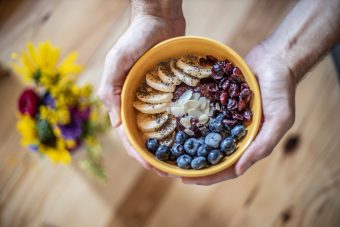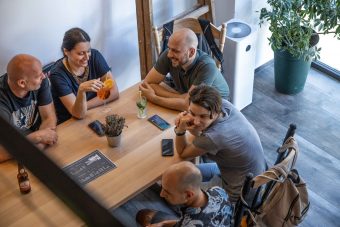
I t took seven months for the idea to develop into a plan and for the doors of the first Serbian vegan and low waste café, VeZa, to finally and ceremoniously open. There is no product in their offer that is of animal origin, or created by animal exploitation, and the determinant – low waste (reduced amount of waste) refers to the effort of all employees to leave behind as little waste as possible.
The idea for this concept of a café was conceived in November 2019, and due to the state of emergency, they started working only in June 2020. However, the owner, Jelena Disić, believes that the situation with the pandemic both hindered and helped because it left additional space for considering some ideas and business models.
EP: Why did you choose to open a vegan and low waste café?
Jelena Disić: I have been actively fighting for animal rights for seven years, and less than two years ago, I founded the Vegan Community with my friends. Our association strives to create and strengthen the vegan community in Serbia, and this is just another step towards that. Veganism is in itself low waste, because every plant-based diet, and the vegan lifestyle, have its own ecological aspect, so these two concepts are closely related, although it may not seem so at first glance. My business partner and I, along with our best friend, decided to bring a little activism to the business, and that’s how we made VeZa.
EP: What are the reactions to this concept and food offer?
Jelena Disić: Every day, more and more people come to VeZa. I am especially thrilled that our acorn cappuccino has become an already recognizable product in the city, and that is why many people visit us. Acorn is the fruit of the oak, which is quite common in our region and which, unlike coffee, has no negative impact on the soil and the environment. In the offer of our café, you will find only homemade, cold-pressed juices and water kefir (a drink similar to carbonated juice, full of vitamin B). We try to procure products from local producers who work responsibly.
In focus:
EP: How did you reduce the amount of waste generated in the food preparation process?
Jelena Disić: We try not to use anything from disposable packaging, which is the first and perhaps most important step towards reducing waste. We have metal, bamboo and plastic straws, we serve sugar in bowls, we use metal spoons, etc. Also, we make our milk (from coconut, almonds, hazelnuts), then peanut butter, chia pudding, and sunflower spread that we use for our sandwiches. We recycle all the waste we have left; we use Frosh brand products for washing dishes, which are both vegan and ecological, which is another way in which we contribute to the protection of the environment.

EP: What happens to food that is not used during the day shift?
Jelena Disić: Fortunately, we do not have large surpluses of food. Usually, we have only biodegradable waste from squeezed juices. For now, we are simply throwing it away because due to legal regulations, composting is not possible indoors, i.e. in a bar. Composting is, by the way, a crucual thing – in that way, we return to nature what it has given us. We are preparing to install a composter in the garden soon.
EP: How do you pack takeaway food, and have you used secondhand furniture to furnish the space?
Jelena Disić: We have reusable packaging that is taken on bail, which the majority of guests uses. Some even bring their bowls. As for takeaway coffee, we sell reusable cups for 300 dinars, and with the cup, you get coffee for free. All the chairs in our café are redesigned old chairs from the seventies and eighties of the last century, which the furniture designer revived especially for our café.
Interview by: Jovana Canić
Read the whole interview in the new issue of the Energy portal Magazine CIRCULAR ECONOMY, march 2021 – may 2021.



